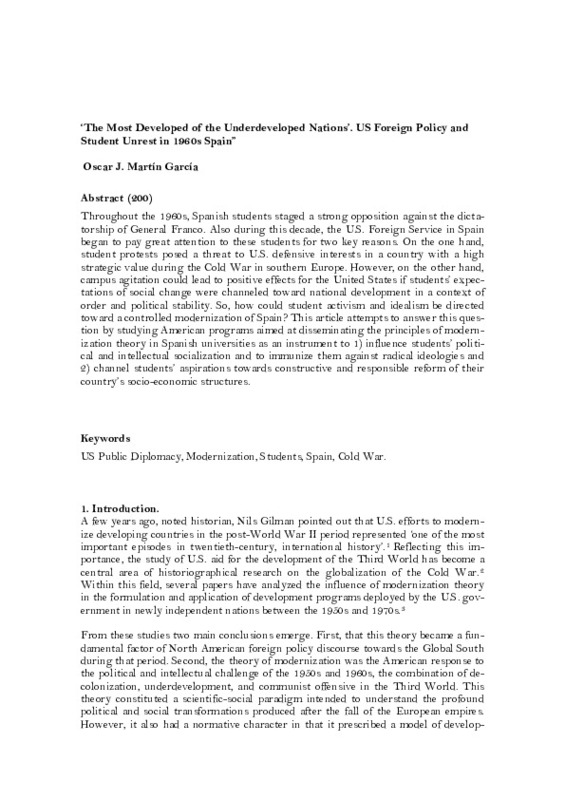JavaScript is disabled for your browser. Some features of this site may not work without it.
Buscar en RiuNet
Listar
Mi cuenta
Estadísticas
Ayuda RiuNet
Admin. UPV
'The Most Developed of the Underdeveloped Nations'. US Foreign Policy and Student Unrest in 1960s Spain
Mostrar el registro sencillo del ítem
Ficheros en el ítem
| dc.contributor.author | Martín-García, Oscar José
|
es_ES |
| dc.date.accessioned | 2024-01-09T19:01:52Z | |
| dc.date.available | 2024-01-09T19:01:52Z | |
| dc.date.issued | 2019-05-04 | es_ES |
| dc.identifier.issn | 0707-5332 | es_ES |
| dc.identifier.uri | http://hdl.handle.net/10251/201655 | |
| dc.description.abstract | [EN] Throughout the 1960s, Spanish students staged a strong opposition against the dictatorship of General Franco. Also during this decade, the U.S. Foreign Service in Spain began to pay great attention to these students for two key reasons. On the one hand, student protests posed a threat to US defensive interests in a country with a high strategic value during the Cold War in southern Europe. However, on the other hand, campus agitation could lead to positive effects for the United States if students' expectations of social change were channeled toward national development in a context of order and political stability. So, how could student activism and idealism be directed toward a controlled modernization of Spain? This article attempts to answer this question by studying American programs aimed at disseminating the principles of modernization theory in Spanish universities as an instrument to (1) influence students' political and intellectual socialization and to immunize them against radical ideologies and (2) channel students' aspirations towards constructive and responsible reform of their country's socioeconomic structures. | es_ES |
| dc.description.sponsorship | This work was supported by the Ministry of Economy and Competitiveness of Spain under research project `La modernización del sistema educativo y científico español en su dimensión internacional (1953-1986). (HAR2014-58685-R). | es_ES |
| dc.language | Inglés | es_ES |
| dc.publisher | Taylor & Francis | es_ES |
| dc.relation.ispartof | The International History Review | es_ES |
| dc.rights | Reserva de todos los derechos | es_ES |
| dc.subject | US public diplomacy | es_ES |
| dc.subject | Modernization | es_ES |
| dc.subject | Students | es_ES |
| dc.subject | Spain | es_ES |
| dc.subject | Cold War | es_ES |
| dc.title | 'The Most Developed of the Underdeveloped Nations'. US Foreign Policy and Student Unrest in 1960s Spain | es_ES |
| dc.type | Artículo | es_ES |
| dc.identifier.doi | 10.1080/07075332.2018.1446999 | es_ES |
| dc.relation.projectID | info:eu-repo/grantAgreement/MINECO//HAR2014-58685-R/ES/LA MODERNIZACION DEL SISTEMA EDUCATIVO Y CIENTIFICO ESPAÑOL EN SU DIMENSION INTERNACIONAL (1953-1986)/ | es_ES |
| dc.relation.projectID | info:eu-repo/grantAgreement/Ministerio de Economía y Competitividad//RYC-2016-20120//SUBVENCIONES A LA CONTRATACION DE DOCTORES POR CENTROS DE I+D. RAMON Y CAJAL 2016/ | es_ES |
| dc.rights.accessRights | Abierto | es_ES |
| dc.description.bibliographicCitation | Martín-García, OJ. (2019). 'The Most Developed of the Underdeveloped Nations'. US Foreign Policy and Student Unrest in 1960s Spain. The International History Review. 41(3):539-558. https://doi.org/10.1080/07075332.2018.1446999 | es_ES |
| dc.description.accrualMethod | S | es_ES |
| dc.relation.publisherversion | https://doi.org/10.1080/07075332.2018.1446999 | es_ES |
| dc.description.upvformatpinicio | 539 | es_ES |
| dc.description.upvformatpfin | 558 | es_ES |
| dc.type.version | info:eu-repo/semantics/publishedVersion | es_ES |
| dc.description.volume | 41 | es_ES |
| dc.description.issue | 3 | es_ES |
| dc.relation.pasarela | S\506316 | es_ES |
| dc.contributor.funder | Ministerio de Economía y Competitividad | es_ES |







![[Cerrado]](/themes/UPV/images/candado.png)

